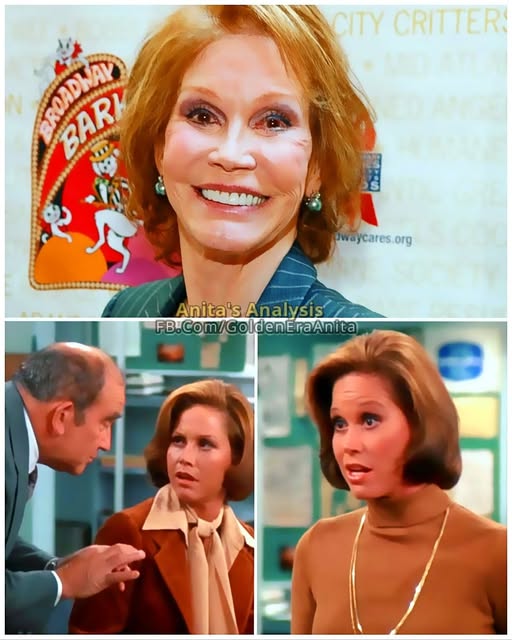
On the morning of January 24, 2017, Mary Tyler Moore sat quietly in her Greenwich, Connecticut home, wrapped in a soft blue blanket as winter light filtered faintly through the frosted windows. Her husband, Dr. Robert Levine, had arranged her chair so she could see the snow-dusted trees, a view she always said reminded her of childhood winters in Brooklyn. Mary’s breathing had grown shallow, her once vibrant voice reduced to a faint murmur, but she still managed the occasional smile when Robert read aloud passages from her memoir “After All” (1995).
She had grown frailer in recent years, her battle with Type 1 diabetes diagnosed in 1969 marking a long and complicated journey that slowly reshaped her days into quiet routines. Mornings began with gentle stretches, guided by a nurse who had become part of the household. Music followed, often Frank Sinatra or classical piano, filling the stillness with the echoes of her youth. By late morning, she would spend time with photographs, her eyes softening at memories from “The Dick Van Dyke Show” (1961–1966) and the groundbreaking “The Mary Tyler Moore Show” (1970–1977). She would sometimes whisper lines from those days, almost to herself, testing the rhythm of comedy that had once flowed through her like second nature. Afternoons were quieter, her energy too limited, so Robert or close friends read to her, the sound of familiar voices bringing her calm.
January 25, 2017, was a Wednesday filled with hushed tones and somber watchfulness. Mary had been hospitalized days earlier with pneumonia complications, and though she insisted she wanted peace at home, her fragile state demanded care. By the early afternoon, her condition worsened. She passed away at the age of 80, her husband at her side, his hand clasping hers as the snow continued to fall outside the hospital window. The moment was quiet, without spectacle, a gentle slipping away from a world she had brightened with laughter and grace.
Mary’s bond with Robert had been one of her strongest anchors in later life. Married in 1983, their partnership endured through health battles and personal sorrows, including the tragic loss of her only son, Richie, in 1980. Their relationship was never about Hollywood lights or public appearances, but about resilience, small comforts, and the steady devotion that carried her through difficult years. For Mary, family meant intimacy, shared strength, and unwavering loyalty.
Even as her health declined, her wit never dulled. She once said with a sly grin to a friend visiting her bedside, “Life may throw you scripts you never auditioned for, but you still have to hit your mark.” Her humor, even in frailty, reminded everyone around her of the spark that had once inspired millions to believe in the independence and strength of women on television.
Beyond her iconic roles, Mary became a powerful advocate. Her decades-long dedication to the Juvenile Diabetes Research Foundation brought her before Congress and countless fundraisers, where she spoke candidly about living with a disease often misunderstood. For many, she was more than Laura Petrie or Mary Richards; she was a symbol of courage, using her fame not for indulgence but for awareness.
Her career had carried her across an extraordinary range, comedy, drama, even Broadway, with performances in “Ordinary People” (1980), which earned her an Academy Award nomination, and “Thoroughly Modern Millie” (1967), which showcased her lighthearted charm. Awards mattered less to her than the chance to connect, to make audiences feel both joy and truth. Colleagues often recalled her laughter on set, the way she lightened long shooting days with jokes that never failed to land.
In her later years, she often looked through boxes of keepsakes, scripts marked with notes in the margins, Polaroids from sets, handwritten fan letters from women who said she made them believe independence was possible. Those quiet moments brought her comfort, grounding her not in nostalgia but in gratitude.
Mary Tyler Moore left this world as she had lived in it: gracefully, quietly strong, and forever entwined with the laughter and courage she gave to others. Her presence lingers like a soft refrain, reminding us that strength and tenderness can live in the same breath.
